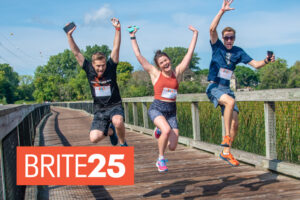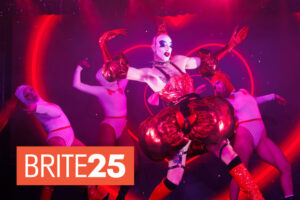The typical attendee has evolved, and as an organiser it is more important than ever to understand who to target and how to reach out to them effectively.
For Eventbrite’s recent UK/I RECONVENE Sessions event “Attendee Personas: Sell More Tickets to The Right People”, three event organisers shared how they were able to identify their ideal audience and target them effectively through optimising their messaging to ensure they had the best experience.
Watch the full event recording – featuring Katie McPhee, founder of Wineknow, Gaia Beck, founder of Cocktails and Conversation and Bobby Nanua, director of Gin and Rum Festival.
Keep reading for a sneak peek at some of the top tips shared by the organisers. And don’t forget to watch the full video for in-depth insights. For additional tips about how to find and target your ideal audience, plus an overview of the top 7 attendee personas we identified in a recent survey, be sure to check out our Guide to Attendee Personas.

Gaia Beck, Founder, Cocktails & Conversation
Gaia is the founder of Cocktails & Conversation, an event company that hosts London’s most exciting dating and networking events. With over 10 years experience in running events, Gaia has a wealth of knowledge in event marketing and sponsorship.
- Speak your audience’s language
Understanding which messaging resonates with your audience and remaining consistent is crucial to better targeting your audience. Gaia rejected “online-speak” and focused on a positive tone of voice which differentiated her offering from competitors. She says, “I bear in mind who they are, the language they like to hear, and I emulate that so they feel comfortable and at home when I am communicating to them.”
- Align expectations and provide reassurance
After finding out who your typical attendee is, the next step is to find out what they want from an event and being able to communicate this clearly to them. Attendees are often seeking a clear agenda and reassurance of being comfortable at your event.
- Utilise competitions and giveaways
As an alternative to offering discounts, you can also use competitions and giveaways to increase exposure to your event. Instead of compromising her revenue stream, Gaia successfully used this tactic to boost last-minute ticket sales.

Bobby Nanua, Director, Gin & Rum Festival
The Gin & Rum Festival was established in 2018 by Bobby Nanua and has since become the largest UK touring festival dedicated to gin and rum.
- Experiment with ticket sales strategy
“Previously we would launch the event and target the ticket sales 12-16 weeks before the event, whereas this year we have launched all of our events a year before the events and that has had a massive success because we have managed to bank our ticket sales early on, giving us time to focus on how to make our event better”, Bobby says.
- Listen to attendee feedback
Make sure your attendees feel heard and take on board their feedback after an event. You can incorporate this into future promotions to optimise your messaging. Post-event surveys can be an invaluable tool for gathering feedback to continually improve future events. Including this feedback on resource and FAQ pages can help your audience feel reassured before an event.
- Different events may attract different personas
Bobby saw that specific personas attend the various scheduled sessions during his festival weekends (morning, afternoon and evening slots) and knowing this allows him to tailor both the promotions and post event engagement to ensure it resonates with the right audience. Eventbrite’s 2023 Trends Report identified seven key attendee personas that organisers should be aware of.

Katie McPhee, Founder, Wineknow
Katie is founder of Wineknow, a nonprofit event series aiming to make wine education more inclusive and featuring a diverse range of wine educators.
- Build trust with collaborations
The choice of venue is always a key consideration. It is important to have your target audience in mind when making the decision of where to host the event. Katie says, “Identifying organisations and partners with a shared ethos is where we have seen traction.”
- Utilise customer feedback for better positioning
Challenging your assumptions can be crucial to better targeting your target audience. Based on customer feedback, Katie found that focusing on what the event doesn’t provide resonated with audiences who saw this as a key differentiator.
- Use focus groups to understand your audience
The best way to understand your audience is by talking to them directly. Katie utilised mini focus groups when starting out to better understand the demographic and what they expected from a wine tasting event. This allowed her to deliver events that catered specifically to this target audience.
Closing Thoughts
All three creators have a desire to continue understanding their (often evolving) audience and improving how they target them. Their insights highlight why it is critical to understand attendee personas and know what they expect from an event.
Whether you’re a fledgling organiser or a seasoned veteran looking to grow your events, you can contact our expert team for more information on how to reach your target audience more effectively and sell more tickets.






